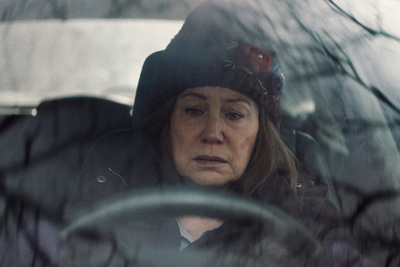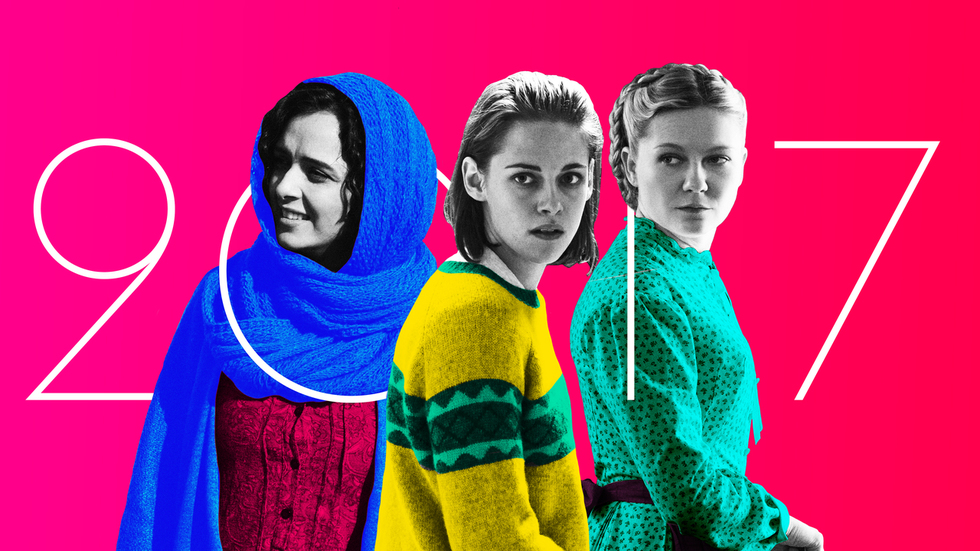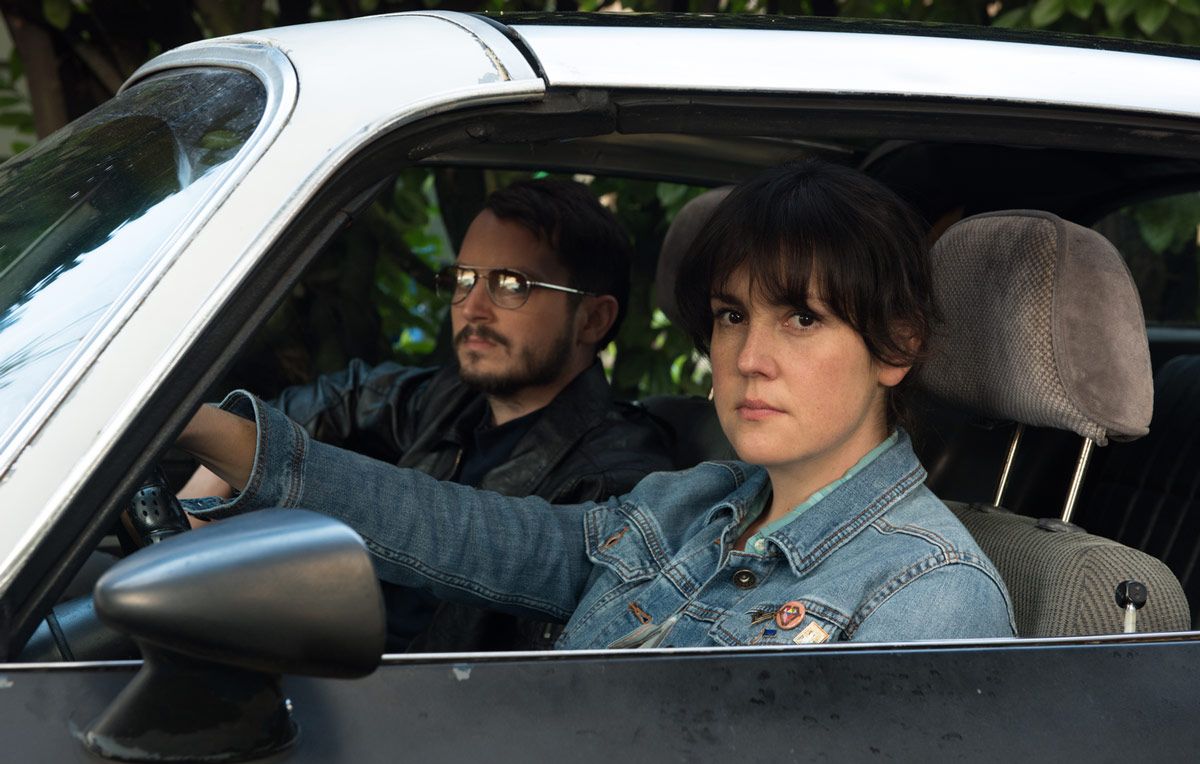
BY MATTHEW ENG |
The 10 Best Female Film Performances of Early 2017
Don't let these exemplary screen performances disappear into the second-half of the year.

Award-worthy film acting isn't a late-year phenomenon, despite the evidence that AMPAS and other institutions offer to the contrary. Here, then, are ten of the most impressive female film performances from the first six months of the year, each one a captivating, character-specific triumph that is worth visiting (and revisiting) within the coming months.

Taraneh Alidoosti, The Salesman
In Asghar Farhadi’s Oscar-winning moral parable The Salesman, the writer-director’s longtime acting collaborator Taraneh Alidoosti delivers a stunning central turn that earns our admiration for what the actress both does and doesn’t do. As Rana, a married Iranian actress who is assaulted by a stranger one night in a new apartment, Alidoosti refuses to embroider the character with personal touches or make her exceptional in ways that transcend the confined events and traumatic revelations depicted within the film. This daring lack of distinctiveness could conceivably run the risk of alienating an audience were it not for the actress’ sterling, measured technique, which betrays potent flashes of toughness and devastation, but mostly an increasing recessiveness that proves just as worrisome to those surrounding her on screen as it does to the engrossed viewer. Alidoosti’s watchful restraint consummately traces the arc of an everywoman struggling to collect her bearings after a harrowing encounter, all the while privately pushing back against a role which she never intended to play — that of victim.

Anne Dorval, Heal the Living
Anyone who has been following the speedy rise of Québécois filmmaker Xavier Dolan this decade has surely encountered the work of actress Anne Dorval, Dolan’s most reliable collaborator, whose blistering, brilliant work in I Killed My Mother remains arguably the finest performance within Dolan’s young but prolific oeuvre. This year, Dorval featured prominently in Heal the Living, a gorgeous, wide-ranging drama from the skillful French helmer Katell Quillévéré, whose films remain seldom seen or even screened in the States. In her latest, Quillévéré dexterously balances a host of fleeting but fully-rounded characters whose stories are joined together by the tragic, accidental death of a 17-year-old boy. Dorval’s Claire, a former violist preparing herself and her loved ones for the consequences of her rapidly-degenerating heart condition, is the film’s most stirring inhabitant, thanks in largest part to Dorval, whose directness of feeling, however elegantly understated, allows us to perceive each and every shift in her character’s uncertainty journey. So often cast by Dolan as brittle or gaudy matriarchs, Dorval excels here as a mother whose soothing tranquility doesn’t conceal but actually deepens the flickers of fear that occasionally come to the surface. That Quillévéré builds her entire film towards a sublime close-up of Dorval, beaming with a sense of joy that renders her almost translucent, is only a testament to the abilities of this seasoned actress, whose technical control never comes at the expense of deep-seated emotional connection.

Kirsten Dunst, The Beguiled
Amid the lush and pleasurably larkish Southern Gothicism of Sofia Coppola’s The Beguiled, the auteur’s creative soulmate Kirsten Dunst turns the character of Edwina, a lonely-hearted teacher and undoubtedly this story’s most plaintive figure, into a tremulously real creation. In Coppola’s earlier The Virgin Suicides and Marie Antoinette, Dunst made ravishing and indelible impressions in performances engineered to convey concrete ideas about the inherent sorrow of young womanhood, as opposed to actually presenting full-bodied, psychologically-rich women. In The Beguiled, Dunst strikes an impressive balance between two assignments, honoring the conceptual archetype of this sullen, self-effacing girl, while also carving out space for some truly experiential character-acting that results in many of the movie’s most bracing moments: an ambivalent confession, a distressing discovery, a reckless sexual offering. Working deftly from a purposely limited register that never lets any one sentiment reach full flower, Dunst proves herself, yet again, to be an expert, breathtaking modulator. By inhabiting Edwina so intimately and yet keeping her cards so close to her chest, Dunst ensures that Coppola’s cadre of women will be neither underestimated nor swiftly forgotten.

Salma Hayek, Beatriz at Dinner
Salma Hayek’s performance as the titular, unprepared party guest in Miguel Arteta’s Beatriz at Dinner shouldn’t feel as revelatory as it does. After all, Hayek’s nearly 30-year career has encompassed an Oscar nomination for Julie Taymor’s Frida and numerous collaborations with a whole host of international directors across multiple genres and filmmaking scenes. But then again, Hollywood has so often called upon Hayek to fulfill some truly dispiriting functions, like playing half-formed love interests of Adam Sandler and Kevin James to doing what she can with the usual stockpile of superficial Latina spitfires.
Here, however, Hayek is ideally cast in the type of unconventional, everyday role we always knew she could excel in but has so scarcely been afforded. As Beatriz, a holistic healer who confronts a crisis of faith while at a dinner party attended by amoral elitists, Hayek is a perfectly soulful vessel for the fundamental virtuousness of her protagonist. A less humane film might construct this woman as a sanctimonious punchline, but Hayek, embracing the compassionate yet clear-eyed vision of Arteta and screenwriter Mike White, refuses to take Beatriz as anything less than serious, while still finding moments of gently energetic humor in the character, whose edges turn finer with each outrageous offense. But the real hallmark of Hayek’s performance is her silent, watchful, tension-raising stillness, never more so than in the film’s sobering finale, which unfolds with the eerie enormity of an opera stripped of its music and requires its star to complete Beatriz’s tragic arc using only her body and a handful of words. Hayek delivers, evoking an emotional magnitude behind the dwindling placidity of Beatriz's facade. There isn’t a single moment of this captivatingly casual satire that isn’t elevated by Hayek's star turn, which is hopefully just the start of a late-career full of inspired character work and not a superlative anomaly.

Holly Hunter, The Big Sick
Is Holly Hunter humanly capable of delivering anything less than a first-rate performance? As someone whose budding stages of cinephilia are closely tied to Hunter’s vivid and versatile array of heroines, I can affirm that all the available evidence suggests she is not. Unfortunately, her preternatural ability to slide between personalities defined either by frankness (Broadcast News, Raising Arizona) or mystery (The Piano) has been sorely underused in recent years as the surfeit of wide-ranging big screen opportunities afforded her at the end of the last century slowly and unceremoniously dried up. But Hunter is back in fine form in Michael Showalter’s The Big Sick, bringing fantastic understanding to her crucial supporting role as a mother who must contend with a comatose daughter (Zoe Kazan) and said daughter’s involuntarily involved ex-boyfriend (Kumail Nanjiani). Hunter barges into the film with a flinty exterior that’s as delightful to study as the character’s eventual softening. She reveals a woman of buried resentments but a casually inviting charm, which sustains our interest even as the character proves less integral to the film than initially assumed. The Big Sick may not belong in the canon of top-tier Hunter turns — and bully for her for giving us so much untouchable screen acting to savor over the years. But I doubt there’s a single special effect more entertaining to watch this summer movie season than the sight of Hunter, her brows furrowed and eyes on fire, as she lays into a racist heckler at one of Nanjiani’s stand-up shows. The scene is a crowd-pleasing joy and so, as always, is Hunter.

Kirin Kiki, After the Storm
“Goodness” is such a notoriously difficult feature to personify on screen that it’s all too easy for an actor’s interpretation to verge on the overly earnest or even downright saintly, rendering one’s character as a beaming dream of a human being rather than an actual human being. But when done well, the result is something less inclined towards idealization and more towards what Kirin Kiki accomplishes in Hirokazu Kore-eda’s gorgeous drama After the Storm. As Yoshiko, an elderly woman gently prodding her adult son Ryôta (Hiroshi Abe) to change his shiftless ways, Kiki creates an inarguably “good” person who clearly — and perhaps foolishly — invests all her hope in the unlikely reconciliation of Ryôta’s broken family. But the lived-in modesty of Kiki’s playing is enlivened by a sharpness of phrasing that makes so many of her lines into unexpected punchlines, detectable even to those of us who don’t speak Japanese. And Kiki’s emotional luminosity, which Kore-eda banks on to put over scenes that in anyone else’s hands might wilt into mawkishness, signals a resiliency that has not been dimmed by decades of disappointment. Kiki not only enables us to understand why Yoshiko believes so completely in her son’s potential but why optimism in and of itself can be a necessary beacon during life’s roughest storms. In doing so, her performance aims for the heartstrings but ultimately reaches the head as well.

Melanie Lynskey, I Don’t Feel at Home in This World Anymore
Melanie Lynskey’s angelic, made-to-be-filmed face scowled and beamed so exquisitely in Heavenly Creatures that it lifted Peter Jackson’s extraordinary portrait of pathological girlhood into the upper echelons of essential nineties cinema. In the decades since, Lynskey has proved herself to be a prolific blessing to American indie filmmakers, from Clea Duvall and Todd Louiso to Joe Swanberg and Macon Blair, whose directorial debut, I Don’t Feel at Home in This World Anymore, nabbed top prize at this year’s Sundance Film Festival, a victory made deserving, in no small part, by its gifted leading lady. As Ruth, a depressed nursing assistant whose humdrum life is sent into a tailspin after her home is burgled, Lynskey provides profound feeling and a perpetually grounded center to Blair’s comical, character-driven thriller. Her ever-expressive face can summon both priceless humor and uninhibited poignancy through one perfectly-modified crinkle, sliding with graceful fluidity between countless states of mind without ever drawing attention to the hardworking actress behind the character. In the fleeting moments when the film’s propulsive narrative progression threatens to overshadow the actual people on screen, Lynskey’s specificity and thought-provoking rejection of easy resolutions never let us forget the beleaguered woman at the core of this story, embodied by a poised and practiced professional so often cast in supporting parts who somehow always finds her way to the heart of her films.

Cynthia Nixon and Joanna Bacon, A Quiet Passion
When actresses of a certain age talk about the difficulty of locating roles with more dynamism than the beatific, back-patting wife-mothers of mainstream American movies, one can imagine that they’re dreaming of the kind of acting challenges illustrated in A Quiet Passion, Terence Davies’ quietly radical biographical portrait of Emily Dickinson. As the ahead-of-her-time poet, Cynthia Nixon, a redoubtable trouper who has been handed mostly throwaway parts in midlevel movies for the better part of the decade, delivers what is almost surely the performance of her career, a characterization of such galvanizing psychological precision and emotional ferocity that it easily remains unseated as the year’s best performance, period. If it’s rare to see a middle-aged woman at the center of a contemporary picture, it’s considerably rarer to see a middle-aged woman explore a role with the intelligence and vitality that Nixon exhibits here, unbothered by any need to be “accessible” or “likable” and working in perfect tandem with an auteur whose cinematic prowess is matched only by his rare sensitivity.
Through such uncommon artistic freedom, Nixon is able to turn her Emily into a fascinating paradox: her sweet-sounding recitations of Dickinson’s poetry stand in jarring contract to the seething crypt-keeper who rebukes both the honest cordialities and moral lapses of those around her. Nixon never attempts to resolve these discordant traits, knowing full well, like her film, that no person (and especially no 19th-century literary legend) can ever be boiled down to one thing, much less explained away. Instead, she commits to the role and all its complexities with an unsparing intensity that evokes the despairing female characters of Ingmar Bergman’s chamber dramas and is movingly counterpoised by the supporting efforts of Joanna Bacon, a veteran British actress whose haunting delicacy as Dickinson’s mother makes this anguished matriarch into the silent soul of the movie. Bacon’s cracked, quivering facade bespeaks a multitude of secret sadnesses, concealing the depths of feeling that Nixon so bracingly lays bare. Their exemplary, note-perfect performances, alongside those of Jennifer Ehle, Jodhi May, and Catherine Bailey, paint something like a cinematic utopia, in which character is unanimously privileged above all else.

Kristen Stewart, Personal Shopper
There’s a deceptive bluntness to the themes Olivier Assayas lays out in Personal Shopper, a ghost story about the personal tremors of loss and the grief that follows and subsides but never fully disappears. Assayas’ images remain as ravishing as ever, enhanced this time by a thrilling air of mystery that his exceedingly straightforward script might have done well to replicate. Lucky for Assays that his foremost collaborator on this project is an artist who excels at embodying enigmas. Kristen Stewart has evolved into an actress with an acute awareness of the role of the viewer. Her fine-boned face can alight with limpid candor even as her physical vocabulary (comprised of those small and oft-mimicked but increasingly entrancing shrugs, slouches, and fidgets) connotes a steely reserve that confounds us right at the moments we foolishly assume we have a handle on her character.
As Maureen, a soul-sick American medium in Paris wiling away as a haute couture buyer, Stewart pushes her singular minimalism in ever more fascinating ways. She’s a perfect model for Assayas’ illusory compositions, casually contorting her body to blend in with — and just as often distract from — the film’s slick and shimmering surfaces. But Stewart also fleshes out a whole character and the sincerity with which she abandons herself to Maureen’s precarious search for clarity cannot be overpraised. Stewart invites us to play yet another guessing game with her on screen persona’s deeper desires, but the rewards here are even richer than they were in Clouds of Sils Maria. In that previous Assays outing, Stewart dazzled in a smaller role as yet another open book whose pages have been filled with invisible ink. She’s front-and-center this time around and the hold that Personal Shopper eventually claims on our emotional suspension can be directly traced to its gifted star’s moody, slippery presence, which doesn’t only manage to elevate this shifting genre experiment but actually comes to define it.
